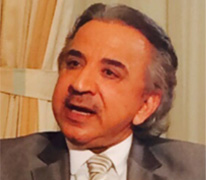ICSFT, BCHR and GCHR Welcome Back Prominent Human Rights Defender Nabeel Rajab
ICSFT, BCHR and GCHR Welcome Back Prominent Human Rights Defender Nabeel Rajab on occasion of his release
25 May 2014
Nabeel Rajab, HRD
The International Council Supporting Fair Trial and Human Rights (ICSFT), the Bahrain Centre for Human Rights (BCHR) and the Gulf Centre for Human Rights (GCHR) welcome back prominent human rights defender, Nabeel Rajab, the President of the BCHR and General Secretary of the GCHR, who is set to be released tomorrow, 24th of May 2014. Rajab will be finally free after a detention that lasted approximately two years. His release comes at a time when thousands of others continue to be imprisoned and targeted on trumped up charges; including BCHR and GCHR founder Abdulhadi Al-Khawaja and other human rights defenders. It is important to note that Rajab is not being released as a gesture of goodwill, but rather because he served the full length of his arbitrary detention sentence. Nabeel Rajab was initially sentenced on 16 August 2012, to three years in prison for advocating peaceful demonstrations to defend the civil and human rights of all the citizens in the country. On 11 December 2012, the Court of Appeal reduced the sentences to two years in prison. During his detention, he faced dire conditions and was subjected to ill-treatment and torture. Nabeel Rajab was arrested after returning from a human rights workshop in Lebanon in May 2012 and charged with “insulting a national institution,” namely, the Ministry of Interior, in his tweets. Two months later he was sentenced to three months in prison for other comments he made on Twitter about Bahrain’s Prime Minister. His conviction on this charge was overturned, but only after he had already served his three-month sentence. The United Nations Working Group on Arbitrary Detention (WGAD) found that Nabeel’s detention was arbitrary as it resulted from the exercise of his universally recognized human rights. As his right to a fair trial had not been guaranteed, his detention was therefore ruled as being arbitrary under categories II and III as defined by the Group. In its Opinion A/HRC/WGAD/2013/12 published on 25 July 2013, the WGAD considered that Nabeel’s detention contravened “articles 19, 20 and 21 of the Universal Declaration on Human Rights and articles 9, paragraph 1, 14, 21 and 22 of the International Covenant on Civil and Political Rights.”[1] Despite this decision by the WGAD, all requests submitted to the authorities for an early release were summarily rejected. On 21 January 2014, the judge in the case again rejected a request that was submitted for the early release of Rajab based on good behaviour. Before passing judgment, the judge reportedly did not a take any action to investigate whether conditions for early release had been met. This was the third attempt submitted by Rajab’s lawyers requesting his release, based on article 349 of Code of Criminal Procedures, which sets conditions for early release. The ICSFT, GCHR and BCHR urge the UN, US administration as well as other governments that have influence in Bahrain including the UK government, the EU and the leading human rights organizations to put real pressure on the Government of Bahrain in order to:- Immediately stop the judicial harassment of human rights defenders; drop all charges against them and release all detained human rights defenders and political prisoners, including Abdulhadi Al-Khawaja and Naji Fateel,
- Stop the exploitation of the judiciary for silencing human rights defenders;
- Immediately stop the daily human rights violations as well as escalating attacks on human rights defenders;
- Guarantee in all circumstances that all human rights defenders in Bahrain are able to carry out their legitimate human rights activities without fear of reprisals, and free of all restrictions including judicial harassment;
- Immediately stop all forms of reprisals against human rights defenders in Bahrain.


